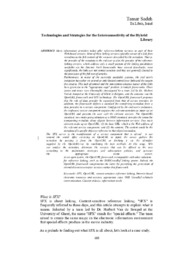| dc.contributor.author | Saden, Tamar | en |
| dc.coverage.spatial | GR - Θεσσαλονίκη | en |
| dc.date.available | 2005-10-07T12:00:00Z | el_GR |
| dc.date.issued | 2001 | el_GR |
| dc.identifier.uri | http://hdl.handle.net/10797/11015 | en |
| dc.description | Περιέχει το πλήρες κείμενο | el_GR |
| dc.description.abstract | Many information providers today offer reference-linking services as part of their Web-based services. Most of these linking services typically consist of a link from metadata to the full content of the resource described by the metadata. That is, the provider of the metadata to the end user is also the provider of the reference-linking services, which address only a small portion of the linking possibilities available via the Internet. Such frameworks have several drawbacks; most significantly, the links are not context sensitive and they are generally limited to the provision of the full text of articles. Furthermore, in many of the currently available systems, the end user's institution has either no control or only limited control over links and the targets they lead to. This lack of control and the non-context-sensitive nature of the links have given rise to the "appropriate copy" problem in today's frameworks. These issues and more were thoroughly investigated by a team led by Dr. Herbert Van de Sompel at the University of Ghent in Belgium, and the outcome was the OpenURL framework and SFX technology. The OpenURL framework proposes that the role of data provider be separated from that of service provider. In addition, the framework defines a standard for transferring metadata from a data provider to a service component. Configured by the end user's institution, the (software) service component acquires the relevant metadata as input via an OpenURL and presents the user with the relevant services. The OpenURL standard, now undergoing adoption as a NISO standard, provides the syntax for transporting metadata about objects between information services. Two main elements make up an OpenURL: (1) the base URL, which is the Web address of the relevant service component; and (2) the content. The content could be the metadata of a specific object or reference to that object's metadata. The SFX server is the manifestation of a service component that is already in use around the world. After receiving an OpenURL as input, the server gathers the metadata by parsing it from the OpenURL or fetching it via the identifier supplied by the OpenURL--or by combining the two methods. At this stage, SFX can analyze the metadata, determine the services that can be offered to the user according to the institution's strategies and subscription policies, and generate the appropriate menu screen. As an open system, the OpenURL framework is compatible with other solutions for reference linking, such as the DOI/CrossRef linking system. Indeed, the OpenURL framework complements the latter by permitting the generation of extended context-sensitive services within that framework | en |
| dc.language.iso | eng | en |
| dc.publisher | Πανεπιστήμιο Μακεδονίας | el_GR |
| dc.source | Το μάνατζμεντ στις ακαδημαϊκές βιβλιοθήκες - 10ο Πανελλήνιο Συνέδριο Ακαδημαϊκών Βιβλιοθηκών | el_GR |
| dc.source.uri | http://abekt.lib.ucy.ac.cy/synedria/10psab/10psab037.pdf | en |
| dc.title | Technologies and strategies for the interconnectivity of the Hybrid library | en |
| dc.type | Conference Object | en |
| dc.subject.uncontrolledterm | SFX | en |
| dc.subject.uncontrolledterm | OpenURL | en |
| dc.subject.uncontrolledterm | Context-sensitive reference linking | en |
| dc.subject.uncontrolledterm | Internet-based electronic resources and services | en |
| dc.subject.uncontrolledterm | Appropriate copy | en |
| dc.subject.uncontrolledterm | OOI | en |
| dc.subject.uncontrolledterm | CrossRef scholarly communication | en |
| dc.subject.uncontrolledterm | Information needs | en |
| dc.subject.JITA | Τεχνολογίες πληροφόρησης και τεχνολογίες βιβλιοθηκών, Δίκτυο υπολογιστών | el_GR |
| dc.subject.JITA | Information technology and library technology, Computer networking | en |
| dc.contributor.conferenceorganizer | Πανελλήνιο Συνέδριο Ακαδημαϊκών Βιβλιοθηκών | el_GR |
| dc.identifier.JITA | LB | en |
